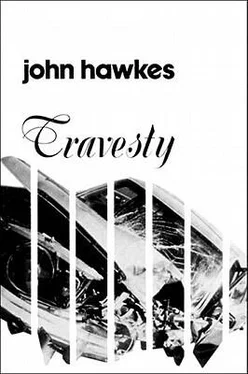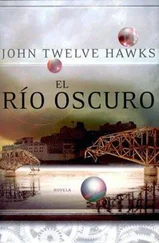John Hawkes - Travesty
Здесь есть возможность читать онлайн «John Hawkes - Travesty» весь текст электронной книги совершенно бесплатно (целиком полную версию без сокращений). В некоторых случаях можно слушать аудио, скачать через торрент в формате fb2 и присутствует краткое содержание. Год выпуска: 1977, ISBN: 1977, Издательство: New Directions, Жанр: Современная проза, на английском языке. Описание произведения, (предисловие) а так же отзывы посетителей доступны на портале библиотеки ЛибКат.
- Название:Travesty
- Автор:
- Издательство:New Directions
- Жанр:
- Год:1977
- ISBN:978-0811206402
- Рейтинг книги:4 / 5. Голосов: 1
-
Избранное:Добавить в избранное
- Отзывы:
-
Ваша оценка:
- 80
- 1
- 2
- 3
- 4
- 5
Travesty: краткое содержание, описание и аннотация
Предлагаем к чтению аннотацию, описание, краткое содержание или предисловие (зависит от того, что написал сам автор книги «Travesty»). Если вы не нашли необходимую информацию о книге — напишите в комментариях, мы постараемся отыскать её.
(1971) is the acting out of a lyric dream;
(1974) a descent into the depths of psychic darkness to the edge of death; and
(1976) an icily comic portrait of the poet as suicide and murderer. It is one of the most cruelly and brilliantly ironic works to be found in contemporary literature.
.. there is 110 doubt that lie is one of the very best living American writers, and
one of his most remarkable fictions.”
— Tony Tanner,
".
Travesty
— John V. Knapp,
Travesty — читать онлайн бесплатно полную книгу (весь текст) целиком
Ниже представлен текст книги, разбитый по страницам. Система сохранения места последней прочитанной страницы, позволяет с удобством читать онлайн бесплатно книгу «Travesty», без необходимости каждый раз заново искать на чём Вы остановились. Поставьте закладку, и сможете в любой момент перейти на страницу, на которой закончили чтение.
Интервал:
Закладка:
Can you understand the peace and satisfaction I felt in that place? The visit was perfectly routine, nothing happened out of the ordinary. And yet from entrance to exit I could not have felt more at home amidst all the paradoxes of this establishment: the unused instruments and archaic machines of medical science located within medieval walls; the sound of birds roosting somewhere amongst surgical knives and old books; the faint smell of cooking food which the antiseptic chemical could not disguise; the doctor himself, who was skilled but thought to be unsavory, and who in his own affliction exemplified the general pomposity and backwardness of our nation's corps of butchering physicians and who in his broken marriage exemplified the soundness of our sexual mores. Then too, I knew for a fact that once every week this poor, ruined man sat entirely alone for precisely two hours in a little nearby movie house devoted only to the showing of so- called indecent films. Understandably, it was this habit rather than the missing leg or absent wife that accounted for his unsavory reputation. No wonder I admired and enjoyed his crippled presence.
As I say, there were no surprises. The doctor, as usual, forced himself to walk the length of the corridor to greet me, thrusting to the side one fat, startled hand for balance and swinging in great arcs from the hip his artificial limb, the use of which typically he had never mastered. We met with effusion; he consulted his files; he enquired about my general health and the health of my wife; unbidden I removed my shirt and undershirt; he disappeared; he returned to his desk; the artificial leg obtruded between us in full and menacing view. Again I welcomed silently the trembling hand, the mucus thick in his throat, the cigarette that was burning his fingers. Again I appraised the awkwardness of the ill-fitting leg, noting as usual that our nation is simply not adept at the crafting of artificial limbs because we are not concerned with the needs and imperfections of the individual human body. Again I realized that in the middle of every night the doctor now puffing and coughing beside me, fumbling over my naked chest with his cold and unsteady hands, must lie awake listening to this same artificial leg walking to and fro on the other side of his bedroom door. He was devoting what remained of his life to this hollow leg which wore a green sock and dusty shoe. But dominated or not by the ugly leg, nonetheless he was listening to the strength of my absolutely reliable heart. I regretted that I had never sat beside him in the old movie house.
I waited, I enjoyed the chilly air on the skin of my chest, shoulders, arms; I surveyed the diseased palm tree below in the public garden; I nodded in pleased recognition when the crippled and perspiring doctor knocked one of his full ash trays to the floor, as he always did. I was pleased with the appearance of the nurse-secretary, whose body had the shape of a girl's and the texture of an old crone's. While she drew as usual a handsome quantity of blood from the thick blue vein in my left arm, I listened to the doctor who was breathing wetly through his nose, his mouth, his nose and mouth together. I listened with pleasure; with pleasure I perceived once more that the old nurse-secre- tary had dabbed herself not with perfume but with the overpowering antiseptic that killed flowers and defined our circumstances.
Time passed like ivory beads on a black thread. My own blood climbed inside the glass. Again I had my brief affair with the old X-ray machine which, after clanking and groaning, rewarded my patience with its sound like a flock of wounded geese in uncertain flight. And I passed exactly the required amount of urine, watched the doctor himself wrapping up the small warm flask with a string and paper, once again marveled that so much painful incongruity could be assembled so awkwardly into a single person.
Well, once again the doctor pronounced me in perfect health, as you would imagine. And of course he suspected nothing, nothing. In all his discomfort and disproportion he retained his purity. Little did he know that in several days and on the other side of the city a laboratory technician, unshaven and smoking a yellow cigarette, would analyze the blood of a man already dead; or that the hazy image of ribs and single lung on the photographic plate would represent only as much reality as the white organs lubricating each other in one of his weekly films.
But there is no justice in the world, since we may safely say that that poor one-legged creature has finally lost his only patient, and through no fault of his own. But what, you ask, if even this wretched man continues to live, why shouldn't we? Why does your closest friend not have within himself that cripple's determination to remain alive? Well, let me answer you slowly, quietly. The problem is that you are being emotional again, rather than rational. You must remember that both my legs are sound and that my wife is faithful. Do you understand?
Yes, she is vomiting. But you need not have mentioned it. I have perfect hearing and am just as sensitive as you to those faint, terrible noises. Do you think I am not listening? That I have not been listening? After all, there is nothing worse than painful human sounds unattached to words. And the contents of my own daughter's stomach …. Even you will concede that my bitterness would be all the more justified. But I am not bitter. And despite all our so-called natural inclinations, why should we not agree that poor Chantal has earned her vomiting? It is the best she can do. And surely it is no worse than your wheezing.
Actually, the music of melodrama (had you allowed us the pleasures of my superb car radio) would not have been a sodden orchestration of wave upon wave of uninteresting feeling but rather a light, sinuous background of muted jazz. The detached and somewhat popular syncopation would have cushioned our every turn while the clear tones of, say, a clarinet would have prevailed and, had he been able to hear them, would have given greater poignancy to the distance between the sleepless goatherd and the momentary, cruel appearance of our headlights in the righthand corner of the wet night. Do you hear that black clarinet? Do you hear the somewhat breezy quality of this dry and sophisticated music? The melody is pleasing, there is even a certain elegance and occasionally a dash of humor in the glassy accompaniment of the invisible piano. How perfect such easy lyricism is for us. What splendid, impersonal sweetness it would have contributed to the tensions of our imaginary and deliberately amateurish film. Well, the radio is already tuned. You have only to extend your arm, reach out with your fingers, touch the knob. But still you are not tempted? Of course you are not. I understand.
A trifle faster? Yes, you are quite right that we are now traveling a breath or two faster than we were. Now is the moment when I must make my ultimate demands. As you can see, my arms are stiffening, my fingers are flexing though I never remove my palms from the wheel, my concentrating face is abnormally white, and now, like many men destined for the pleasures and perils of high-speed driving, now my mouth is working in subtle consort with eyes, hands, feet, so that my silent lips are moving with the car itself, as if I am now talking as well as driving us to our destination. And we are approaching it, that final destination of ours. We are drawing near. Soon we shall be entering the perimeter of Honorine's most puzzling and yet soothing dream. And now beneath the hood of the car our engine is glowing as red as an immense ruby. How unfortunate that to us it is invisible. How unfortunate that the rain is determined to keep pace with our journey.
But while we are on the subject of invalid doctors and vomiting children, and since tonight we seem to be taking our national inventory, so to speak, allow me to say in passing that generally our physical institutions are indeed a match for the inadequacies or eccentricities of our professional personnel. In other words, our buildings of public service are as bad as the people who occupy them. Take the hospital nearest La Roche, for instance. I have not had any firsthand experience with this ominous and in a way amusing place, and in fact have never seen it. But on good authority and thanks to my theory of likenesses, which I have already described to you at length, I know for a certainty that this dark and drafty little place of about twenty beds is not equipped with any separate or special entrance for the reception of emergency cases. None at all. A few lights are burning; several cooks are smoking their stubby pipes in the kitchen; the entire drab interior of the place smells like a field of rotting onions. And there is no emergency entrance. No means of swift and ready access between the narrow cobbled street outside and that small whitewashed room to the right and rear where simple first aid may be administered. No access to this small room for bleeding truck driver or possibly his corpse except through the kitchen. The kitchen. It is a scandal. Even our own remains, such as they may be, will be hurried on rattling litters through the steamy kitchen of the miserable hospital near La Roche, that kitchen in which the cauldrons of soup for the coming day will provide a fitting context for the shoeless foot at dawn. Do you see the humor of it, the outrage? But everywhere it is the same: rooms without doors, sinks without drains, conduits that will never be connected to any water supply, corpses or bleeding victims forever passing through the kitchens of our nation's hospitals.
Читать дальшеИнтервал:
Закладка:
Похожие книги на «Travesty»
Представляем Вашему вниманию похожие книги на «Travesty» списком для выбора. Мы отобрали схожую по названию и смыслу литературу в надежде предоставить читателям больше вариантов отыскать новые, интересные, ещё непрочитанные произведения.
Обсуждение, отзывы о книге «Travesty» и просто собственные мнения читателей. Оставьте ваши комментарии, напишите, что Вы думаете о произведении, его смысле или главных героях. Укажите что конкретно понравилось, а что нет, и почему Вы так считаете.












